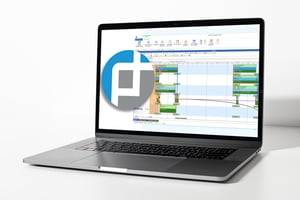Carbon Footprint Calculation and Reduction
The pursuit of sustainability is not merely a trend but a necessity. Supply chain managers in packaging manufacturing facilities find themselves at the forefront of this movement, tasked with the responsibility of reducing carbon footprints while maintaining operational efficiency. As sustainability becomes increasingly intertwined with profitability and reputation, it's crucial to leverage innovative tools and technologies to measure and mitigate environmental impacts effectively.
In this blog, we'll look into the realm of sustainable supply chain management, focusing on carbon footprint calculation and reduction tools tailored for packaging manufacturing. Specifically, we'll explore the integration between PlanetTogether, a renowned supply chain planning software, and leading ERP, SCM, and MES systems like SAP, Oracle, Microsoft, Kinaxis, and Aveva. By harnessing the power of these tools, supply chain managers can pave the way for a greener, more sustainable future.

Carbon Footprint Calculation
Before looking into the tools and technologies, let's establish a foundational understanding of carbon footprint calculation in the context of packaging manufacturing. A carbon footprint represents the total greenhouse gas emissions caused directly and indirectly by an individual, organization, event, or product. In the packaging industry, carbon footprints encompass emissions generated throughout the entire supply chain, from raw material extraction to end-of-life disposal.
Calculating a carbon footprint involves quantifying emissions across various stages of the supply chain, including:
Raw Material Procurement: Emissions associated with the extraction, processing, and transportation of raw materials such as paper, plastics, metals, and inks.
Manufacturing Processes: Emissions generated during the production of packaging materials, including energy consumption, manufacturing waste, and chemical usage.
Transportation and Distribution: Emissions resulting from the transportation of raw materials, intermediate products, and finished goods between different facilities and distribution centers.
End-of-Life Management: Emissions linked to the disposal, recycling, or incineration of packaging materials after their intended use.
By accurately quantifying these emissions, supply chain managers can identify hotspots, set reduction targets, and implement targeted strategies to minimize environmental impacts while optimizing operational efficiency.

Integration between PlanetTogether and ERP/SCM/MES Systems
Now, let's explore how the integration between PlanetTogether and leading ERP, SCM, and MES systems enhances the capabilities of supply chain managers in addressing sustainability challenges:
SAP Integration: SAP's comprehensive suite of enterprise resource planning solutions seamlessly integrates with PlanetTogether, enabling real-time visibility into production schedules, inventory levels, and resource utilization. By leveraging SAP's data insights alongside PlanetTogether's advanced planning algorithms, supply chain managers can optimize production processes to minimize energy consumption, reduce waste, and lower carbon emissions.
Oracle Integration: Oracle's cloud-based SCM solutions offer robust supply chain planning and execution capabilities, complementing PlanetTogether's scheduling and optimization functionalities. Through seamless integration, supply chain managers gain actionable insights into demand forecasts, supplier performance, and production efficiency. By aligning production schedules with demand fluctuations and inventory levels, organizations can reduce excess inventory, minimize transportation emissions, and enhance overall sustainability.
Microsoft Integration: Microsoft Dynamics ERP solutions integrate seamlessly with PlanetTogether, empowering supply chain managers with end-to-end visibility and control over manufacturing operations. Leveraging Microsoft's Power BI analytics platform alongside PlanetTogether's planning tools, organizations can analyze production data, identify inefficiencies, and implement targeted improvement initiatives. By optimizing production schedules, resource allocation, and order fulfillment processes, companies can achieve significant reductions in carbon emissions while improving profitability.
Kinaxis Integration: Kinaxis RapidResponse offers advanced supply chain planning capabilities, seamlessly integrating with PlanetTogether to facilitate collaborative decision-making and scenario analysis. By synchronizing production plans with demand forecasts, inventory levels, and supply chain constraints, organizations can minimize carbon emissions while ensuring timely order fulfillment and customer satisfaction. Kinaxis' concurrent planning approach, coupled with PlanetTogether's optimization algorithms, enables agile response to changing market dynamics and sustainability objectives.
Aveva Integration: Aveva's Manufacturing Execution System (MES) solutions integrate seamlessly with PlanetTogether, enabling real-time monitoring and control of production processes. By capturing data from shop floor operations and equipment sensors, Aveva MES provides valuable insights into energy consumption, equipment performance, and production efficiency. Leveraging Aveva's MES alongside PlanetTogether's planning capabilities, organizations can optimize resource utilization, streamline production workflows, and reduce carbon emissions across the manufacturing value chain.
In the pursuit of sustainability, supply chain managers in packaging manufacturing facilities must embrace innovative tools and technologies to measure, monitor, and mitigate carbon footprints effectively. By integrating PlanetTogether with leading ERP, SCM, and MES systems such as SAP, Oracle, Microsoft, Kinaxis, and Aveva, organizations can gain actionable insights, optimize production processes, and drive meaningful reductions in environmental impacts.
Through collaborative efforts, industry partnerships, and technological innovation, we can navigate towards a more sustainable future, where packaging manufacturing not only meets the demands of the present but also preserves the planet for generations to come. As supply chain managers, let's harness the power of integration, data-driven decision-making, and continuous improvement to create a greener, more resilient supply chain ecosystem.
Are you ready to take your manufacturing operations to the next level? Contact us today to learn more about how PlanetTogether can help you achieve your goals and drive success in your industry.